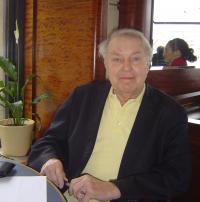“After a year, when I got transferred – at first I was transferred after six months like all the artists in the army into the Army Artists Ensemble, with which I went on a great tour to the Ukraine and Moscow where I was a host in one huge performance, it was a hundred-and-fifty head ensemble, the Alexandrov ensemble, it was amazing. They were mostly former members of Youth Union’s artistic ensembles, thus being top class artists, and the performance was spectacular. And I was a sergeant, but they temporarily made me a lieutenant, so that I wouldn’t look stupid there, and I, in a lieutenant’s uniform, was thus announcing: »Načinajetsja koncert...« I have always relied on my having quite good pronunciation, I don’t even have to be able to speak the language well. And shortly after, I was riding a train with Radim Drejsl, he was a great composer, but suffered from severe depressions at that time, a girlfriend had left him, and then he found out that it hadn’t worked – I mean his songs, that they had actually paved the way to hell, and he jumped out of a window. In the Rudolfinum concert hall. I went to work, dressed in uniform, because at that time we were allowed to sleep at home, and Radim Drejsl, who killed himself by jumping out of a window, was lying there. After that I was transferred to the Czechoslovak Soldier magazine, which was quite progressive for the time. It was ideologically loaded, of course, but among the editors there were Vojtěch Michalík, a poet, Stanislav Neumann, Jiří Šotola, Karel Šiktanc, there was the generation of writers who were all around twenty-five, and all were headed by Vlado Kašpar, an incredible person, who had been a partisan, then a Red Army soldier, then when Czechoslovakia was supporting the birth of the State of Israel, he was training the Hagannah fighters here, and then naturally he got kicked out, because he got into the first wave of those who became unwanted. But he was quickly released, and, in order not to be in the army any more, was transferred here as an editor-in-chief of this magazine. And he basically allowed us to do whatever we wanted. When you realize that during Husák´s normalization era, basically nothing was allowed, and the September Nights were released as a series in six parts in the bi-weekly, and five months later the army theatre adapted them in 1955, and it continued, and that the minister of defence came there and prohibited it, the day after they confiscated my party’s card, and they led us together with the Czechoslovak Army Theatre ensemble to the Czechoslovak Army Building, where generals were yelling at us that we were traitors of the nation – there were the actors Sovák, Brodský, Menšík, Kohout, I was still in my sergeant’s uniform... Three months later, Khrushchev held his speech, my Party member’s card was returned to me, and the minister Čepička got sacked from the army – these things were unforgettable. I think it was the first clash with the regime, but the way I felt it at that time was that I was the right communist and that they were bad communists.”

